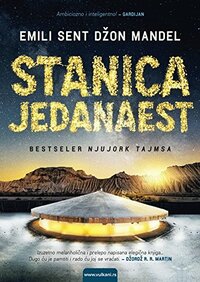Take a photo of a barcode or cover
I decided to read this book after watching the HBO series of the same name. The show is so much better than the book by the way, but I can see how the book itself did a great job of telling the story.
Station Eleven is told from multiple perspectives and is about a flu pandemic that wipes out 99% of the world’s population. Society essentially collapses resulting in people forming small groups to protect themselves. One of these groups is the Traveling Symphony which is composed of actors and musicians dedicated to preserving the arts.
The book spans multiple years and jumps from before the pandemic to 20 years after the pandemic. I enjoyed how the author wrote about the fall and how each of the characters were connected. I think this part of the story is something that the HBO series did a much better job at depicting. There’s not much action but there is plenty of drama and I found the book to be interesting overall - 4 stars!
Station Eleven is told from multiple perspectives and is about a flu pandemic that wipes out 99% of the world’s population. Society essentially collapses resulting in people forming small groups to protect themselves. One of these groups is the Traveling Symphony which is composed of actors and musicians dedicated to preserving the arts.
The book spans multiple years and jumps from before the pandemic to 20 years after the pandemic. I enjoyed how the author wrote about the fall and how each of the characters were connected. I think this part of the story is something that the HBO series did a much better job at depicting. There’s not much action but there is plenty of drama and I found the book to be interesting overall - 4 stars!
challenging
hopeful
inspiring
medium-paced
Plot or Character Driven:
Character
Loveable characters:
Yes
Diverse cast of characters:
Yes
Flaws of characters a main focus:
Yes
hopeful
reflective
tense
fast-paced
“Station Eleven” was pleasantly unexpected. This story is one of appreciating the present moment and the little details that make life worthwhile. It merges the classic, post-apocalyptic desolation of a wiped out civilization with themes of hope, art, and beauty, bouncing between an eccentric cast in a pre-pandemic world, and the post-pandemic Travelling Symphony, propelled by the motto: “Survival is Insufficient.”
As someone who loves apocalyptic literature, I enjoyed the unique approach that “Station Eleven” takes. I typically favor nonlinear narratives, and really like the loose and interconnected storylines in this book. I think St. John Mandel mostly accomplished what she set out to do here, which was to spread a message of positivity; at the same time, I think the vagueness makes the book feel a bit empty.
The shifting chronology and emphasis on broader themes limits character development and world-building, causing the landscape to feel less immersive and more like a backdrop that’s simply there. There’s not much of a plot beyond character conflict, and I didn’t find myself emotionally invested in any of the characters lives, despite wanting to be.
All in all, “Station Eleven” is a solid book about humanity and hope. I can see why people would love it. It’s well written, but the story stays fairly surface level.
As someone who loves apocalyptic literature, I enjoyed the unique approach that “Station Eleven” takes. I typically favor nonlinear narratives, and really like the loose and interconnected storylines in this book. I think St. John Mandel mostly accomplished what she set out to do here, which was to spread a message of positivity; at the same time, I think the vagueness makes the book feel a bit empty.
The shifting chronology and emphasis on broader themes limits character development and world-building, causing the landscape to feel less immersive and more like a backdrop that’s simply there. There’s not much of a plot beyond character conflict, and I didn’t find myself emotionally invested in any of the characters lives, despite wanting to be.
All in all, “Station Eleven” is a solid book about humanity and hope. I can see why people would love it. It’s well written, but the story stays fairly surface level.
something incredibly eerie reading a book about a pandemic written pre-pandemic after living through a pandemic.
adventurous
emotional
inspiring
reflective
medium-paced
Plot or Character Driven:
A mix
Strong character development:
Complicated
Loveable characters:
Complicated
Diverse cast of characters:
Yes
Flaws of characters a main focus:
No
adventurous
dark
emotional
hopeful
inspiring
sad
tense
medium-paced
Plot or Character Driven:
Plot
Strong character development:
Yes
Loveable characters:
Yes
Diverse cast of characters:
Yes
Flaws of characters a main focus:
No
hopeful
sad
tense
medium-paced
Plot or Character Driven:
Character
Strong character development:
Yes
Loveable characters:
Yes
Diverse cast of characters:
Yes
Flaws of characters a main focus:
Complicated
I can see why people would dislike this (I recall seeing lots of low scoring reviews) because it is not a sci fi book despite some being led to believe it is, maybe? This is mostly speculative fiction but is heavy on the literary elements with a very non-linear narrative. It is a pre-COVID book, published 2014 according to my copy, about a flu pandemic (I imagine anyone reading it in 2020 would have felt a bit weird). The action takes place at year zero and year twenty, mostly, but goes back into pre-flu years and to years two, five and nineteen. Time is measured by the pandemic, the end of civilisation. 99% of people have died. We follow a set of characters who have a connection via a man who dies just as the pandemic kicks off, of an unrelated illness. We circle around his life and relationships learning more about the set of characters and how they are connected.
Although slow to get into a plot, it's very tense. Like The Road and other post-apocalyptic fiction I can't think of right now, there are horrible bad guys trying to keep ruining everything for others. As time flicks back and forth, you come to realise that one of these characters will end up as the bad guy. But as the year twenty tense action is actually not a major part of the book, it's more a sad look at how different people survived after the collapse. One lead character is in a travelling orchestra and dramatic society; there is more than survival. There is hope for an awakening, and rebuilding, and learning skills, while some still look back.
There's a great set of discussion questions at the end and I think it would make a good A Level Literature text.
Although slow to get into a plot, it's very tense. Like The Road and other post-apocalyptic fiction I can't think of right now, there are horrible bad guys trying to keep ruining everything for others. As time flicks back and forth, you come to realise that one of these characters will end up as the bad guy. But as the year twenty tense action is actually not a major part of the book, it's more a sad look at how different people survived after the collapse. One lead character is in a travelling orchestra and dramatic society; there is more than survival. There is hope for an awakening, and rebuilding, and learning skills, while some still look back.
There's a great set of discussion questions at the end and I think it would make a good A Level Literature text.
I was not interested in the plot enough to keep going
3.5 stars. The apocalypse itself wasn’t terribly interesting, but the way these characters’ lives intertwined both before and after the pandemic made for an engaging read
“Hell is the absence of the people you long for.”
“Hell is the absence of the people you long for.”





